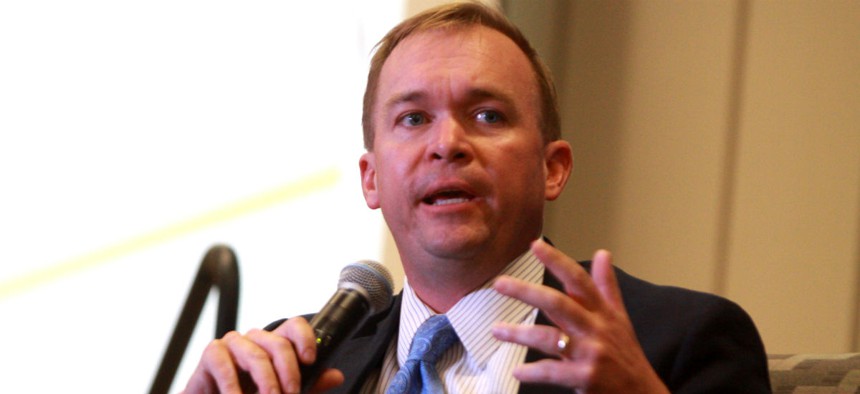
Acting CFPB Director Mick Mulvaney Flickr user Gage Skidmore
Consumer Protection Bureau Won't Be 'Pushing the Envelope' Anymore
Acting director Mulvaney reassures CFPB employees he doesn’t intend to shut the agency down, but recasts its mission.
Mick Mulvaney, the White House budget director now doubling as acting head of the Consumer Financial Protection Bureau, published an essay announcing “a new mission” for the controversial agency: it will stick to statutory authority, cost-benefit analysis and inclusion of credit “providers” as well as credit users.
In a Wednesday op-ed in The Wall Street Journal titled “The CFPB Has Pushed Its Last Envelope,” the former Republican House member and deregulatory enthusiast from South Carolina critiqued what he characterized as a statement from previous Director Richard Cordray, who said, “There’s a new cop on the beat. Pushing the envelope is a loaded phrase, but that’s absolutely what we did.”
The assumption under the bureau’s first and only confirmed director was that “we were the good guys and the financial-service industry was the bad guys,” Mulvaney said. “That entire governing philosophy of pushing the envelope frightens me a little."
(Mulvaney's attribution of the "pushing the envelope" quote to Cordray was deemed incorrect by the New York Times, citing the original Politico story, which attributed it to an unnamed staffer.)
“We are government employees, and we work for the people,” he continued. “That means everyone: those who use credit cards and those who provide the credit; those who take out loans and those who make them; those who buy cars and those who sell them. All of those people are part of what makes this country great, and all of them deserve to be treated fairly by their government.”
Mulvaney, who sent a similar message to staff via email, assured bureau employees that he has “no intention of shutting down the bureau,” and that some cases will require dramatic action. “As members of the executive branch, we are charged with faithfully executing the law,” he noted. “The law mandates that we enforce consumer-protection laws, and we will continue to do so under my watch.”
If the CFPB loses a court case because we “pushed too hard,” he wrote, “we simply move on to the next matter. But where do those we charged go to get their time, their money and their good names back?” his op-ed asked. “If a company closes its doors under the weight of a multiyear Civil Investigative Demand, we still have jobs at CFPB. But what about the workers who are laid off as a result?”
Specifically, Mulvaney wrote that he plans to continue reviewing “everything we do,” from investigations to lawsuits. That means “more formal rule making and less regulation by enforcement.” And staff will do more with “the math,” he wrote, meaning more “quantitative analysis” of costs and benefits, and less reliance on “qualitative analysis.”
Based on percentages of complaints the bureau receives, management will focus more on debt collection and less on the risks to consumers of prepaid credit cards and payday lending, he said.
“I intend to execute the statutory mandate of the bureau to protect consumers,” Mulvaney wrote. “But we will no longer go beyond that mandate. If Congress wants us to do more than it set forth in the [2010] Dodd-Frank Act, it can change the law.”
Mulvaney’s agenda continues to be attacked by progressive and consumer groups. Earlier this week, as noted by news sites Pro Publica and International Business Times, Mulvaney dropped a court case against a payday lender that had contributed to his congressional campaign.
“The Consumer Financial Protection Bureau was established to protect consumers from predatory lenders like World Acceptance Corp., but under Mick Mulvaney’s control the bureau is undermining that important mission,” said Karl Frisch, executive director of the consumer watchdog group Allied Progress, in a statement. “Worse still, Mulvaney’s CFPB appears to be rewarding bad financial actors who also happen to be his campaign contributors.”
This story has been updated to reflect a challenge to the accuracy of Mulvaney's attribution of a quotation to Cordray.







